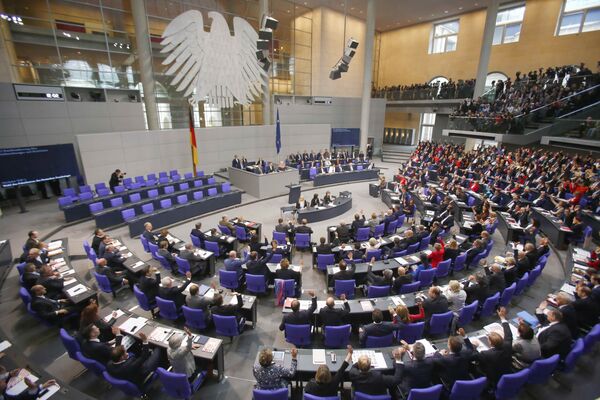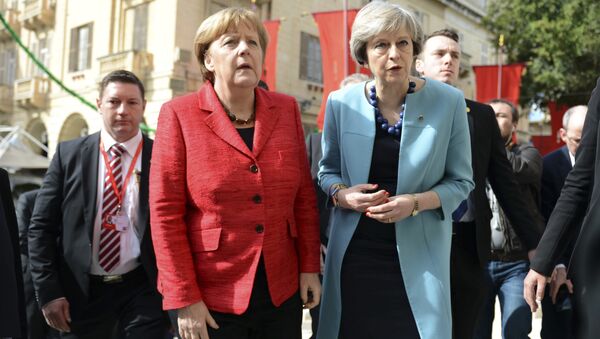After almost nine weeks, the protracted struggle to form a new German government finally collapsed on the evening of November 19 after a tense day of negotiation, plunging the country — and Europe more widely — into major uncertainty, and raising the prospect of fresh elections.
READ MORE: Steinmeier: Germany Facing Situation That Has Not Taken Place in 70 Years
The centrist Free Democrats collapsed Merkel's proposed house of cards shortly before midnight, announcing they were pulling out of the talks. Christian Lindner, FDP leader, explained the parties had been unable to bridge differences on policy, and failed to develop "a basis for trust and a shared idea."

Ever since talks began October 18, the trio had struggled to even agree on the precise problems to be addressed before an agreement is inked, much less on how to address them. Core differences between the trio related to refugee and asylum policy, climate change and the shutting down of a significant number of coal-fired power plants, and tax policy, with the FDP demanding a rapid phase-out of the "solidarity tax" that funds economic development in east Germany.
Merkel, who insists another coalition would've been viable in time, has been forced to go cap in hand to President Frank-Walter Steinmeier. In a subsequent televised statement, Steinmeier Germany faced an unprecedented situation, and he expected all parties to be prepared to help find a solution.
Federal President #Steinmeier speaks of situation without precedent, responsibility for the country goes beyond parties' self-interest, expects readiness for talks from all political parties, will talk to leaders of all political parties & constitutional bodies #Germany #Art63GG pic.twitter.com/2yfzZAZ4qR
— Valentin Kreilinger (@tineurope) November 20, 2017
He will speak to the leaders of Germany's political parties, and the heads of other institutions, to see if a government can be formed, and underlined the importance of forming a government, given all other European nations will be watching developments in the continent's largest economy closely.
"If you think a strong Merkel government will help May with Brexit, you don't understand Europe."
— Christian May (@ChristianJMay) November 20, 2017
Same voices today:
"If you think May can make Brexit progress without a strong Merkel government, you don't understand Europe."
Of those countries, the UK may be surveying the scene with the greatest interest — after all, beyond Brussels, Berlin plays the most significant role in shaping Brexit negotiations. Nonetheless, political analyst Alistair Newton believes the UK would do better to focus on itself.
"There is much uncertainty around Brexit, but ultimate responsibility lies with the UK — the ball is very much in Britain's court. Westminster needs to stump up more funds, do something about the Irish border situation, and come up with something on right to remain. Leaders need to decide what relationship they want with the bloc post-Brexit — what's going on in Germany is not particularly relevant. Although, Merkel's preoccupation with domestic politics is clearly a distraction from European issues in general," Mr. Newton told Sputnik.
Possible Options
Given the Social Democrats continue to refuse to enter a 'grand coalition' with Merkel's CDU/CSU, Merkel's only possible hope of forming a government is via a "Jamaica" configuration with the absconded FDP, and the Greens — and if the FDP cannot be enticed back to the negotiating table, the Chancellor will find herself stuck between a rock and a hard place.
Should the FDP refuse to re-enter talks, Merkel could try to lead minority government, potentially with the support of the Greens, or hold a new election. The latter prospect is one her parties, and the Greens, are very keen to avoid, given Alternative for Germany could score an even better result than the 13 per cent it won in September.
After the collapse of coalition talks;
— Alper Üçok (@AlperUcok) November 20, 2017
Latest opinion poll (Emnid) in Germany
CDU/CSU:31%
SPD:21%
AfD:13%
Greens:11%
FDP:10%
Left:9%
As 75% of Germans want new elections than minority gov.
& Party spending for last election (Mn €)
SPD:24
CDU/CSU:20
Left:6.5
Greens:5.5
FDP:5 pic.twitter.com/nFGQgWQwfe
For their part, AfD have said the "time has come" for Merkel to leave her post due to her "failure" to form a government, and that the Chancellor should accept the need for a fresh vote. The party has ruled out serving in any coalition configuration, and all other parties have likewise ruled out sharing power with the controversial party.
READ MORE: AfD Leader Urges Chancellor Merkel to Resign as Coalition Talks Collapse
FDP leader Lindner had previously mooted the prospect of talks failing outright November 4-5, and suggested his party was "not afraid" of a rerun election — although Mr. Newton suggested the party could face electors' wrath for scuttling coalition talks.
"German voters could punish the FDP for withdrawing and causing so much uncertainty. A lot of those votes could go to the CDU/CSU, but that might not leave Merkel in a better position than now — she needs AfD voters to return to her," he continued.
Should a new election be held, polling suggests the CDU/CSU alliance could secure even less support than in September, when it won 33 percent of votes and 246 parliamentary seats, its worst result since 1949.
SPD leader Martin Schulz says Germany needs new elections (believing that SPD cannot go under 20%). pic.twitter.com/gshs4DKYdC
— Alper Üçok (@AlperUcok) November 20, 2017
The SPD, which came in second, with 20.5 percent of the votes and 153 seats, its worst result ever, may conversely be wishing for a rereun — and leader Martin Schulz had suggested the party does not fear such an eventuality.
"In the unlikely event Merkel's parties aren't the biggest after a new election, and the SPD recovers from its electoral doldrums, they have sworn they would not form a coalition with the Greens and Die Linke, despite being in such coalitions at the state level. The AFD could get even more votes, up to 15-16 percent, but I doubt they will get more than that," Mr. Newton concluded.


